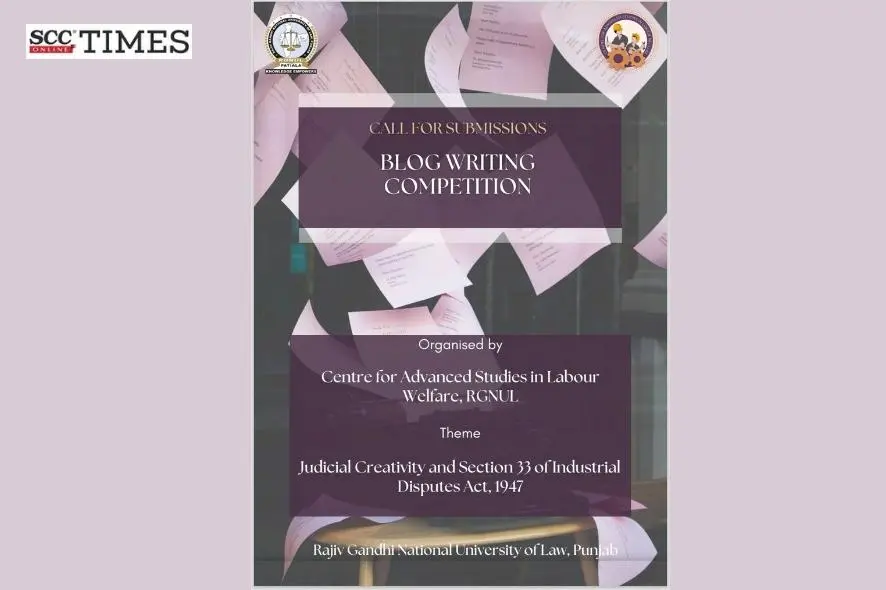ABOUT RGNUL
The Rajiv Gandhi National University of Law (RGNUL), Punjab, was established by the State Legislature of Punjab by passing the Rajiv Gandhi National University of Law, Punjab Act, 2006 (Punjab Act No. 12 of 2006). The Act incorporated a University of Law of national stature in Punjab, to fulfil the need for a Centre of Excellence in legal education in the modern era of globalization and liberalization. The University was accredited with an ‘A’ Grade by the National Assessment and Accreditation Council (NAAC) in 2015. RGNUL, Punjab was granted autonomy under UGC Regulations, Clause 5 Dimensions of Autonomy for Category-II Universities in April 2018. The Ministry of Human Resource Development, Government of India, ranked RGNUL the first amongst the cleanest Higher Educational Institutions, Swachh Campus (2019) in the category of Government Residential Universities.
ABOUT CASLW
The Centre for Advanced Studies in Labour Welfare was established with a view to improve and strengthen the Labour Justice System in India. It strives to uphold and protect the rights of the labourers and their families thereby ensuring them a life of human dignity. The Centre also makes an effort to sensitize the labourers about their rights, which are enshrined in the Constitution of India and other legislations as well. In addition to it, the Centre makes an effort to impart education to the children of labourers on the University campus and makes them aware of their fundamental right to education thereby, making their parents realize their duty towards their children. The Centre has initiated a research project on the migrant labourers. It also has a dedicated blog ‘Labour and Liberty’ catering to the field of labour and employment law.
ABOUT THE EVENT
Theme: Judicial Creativity and Section 33 of Industrial Disputes Act, 1947
The competition will be conducted in two stages to ensure a rigorous and fair evaluation process. The top five entries from across the university will be judged. The submission that best demonstrates a deep understanding of Section 33, along with strong analytical and writing skills, will be declared the winner.
The competition not only provides students with a platform to explore and articulate the complexities of industrial relations law but also offers a special prize to the winner in recognition of their excellence. We encourage all students to participate in this intellectually stimulating competition and contribute to the ongoing discourse on labor welfare.
Call for Submissions Centre for Advanced Studies in Labour Welfare, RGNUL welcomes submissions of Blogs, Articles, Essays, and proposals for Book Reviews through our electronic submission system on a rolling basis.
ELIGIBILITY
All the student of B.A. LL.B., LL.M. or any other recognised degree from any recognised university.
LENGTH
The word limit for the submission shall be 1200-1500 words. The Blog is flexible regarding the word count (up to 1800), depending on the quality of the submission. Co-authorship up to a maximum of two authors, of the same or different institutions is permissible.
ORIGINALITY
Any form of plagiarism is strictly prohibited. The author(s) bear sole responsibility for the accuracy of facts, opinions or views stated in the submitted Manuscript. In case of plagiarism found in the contents of the submitted manuscript, the manuscript shall be subject to rejection. Copyright of all blog posts shall remain with the Centre for Advanced Studies in Labour Welfare. All moral rights shall vest with the author(s).
FORMATTING AND CITATION GUIDELINES
The body of the manuscript should be in Times New Roman, font size 12 with 1.5 line spacing. The end notes should be in Times New Roman, font size 10 with single line spacing. The text alignment should be justified. Referencing and citations must be put up in the form of in-text hyperlinks for Internet sources. In the event that a cited material does not have an online copy or reference, only endnotes must be used. Endnotes for offline sources shall adhere to the Oxford University Standard for Citation of Legal Authorities (OSCOLA) 4th Edition.
SUBMISSION PROCEDURE
All submissions must contain the following: The manuscript should be in .doc or .docx format. The manuscript should not contain the name of the author or his/ her institutional affiliation or any other identification mark. Ensure that the title of the document has been renamed to the title of the post [without any personal detail of the author(s)]. The title of the manuscript should indicate the sub-theme that the author has chosen. The submission must be made through the Google form linked at the end of this page.
NOTE: No cross-publication is allowed.
DETAILS
Registration Link (Link closes on 6th feburary): https://docs.google.com/forms/d/e/1FAIpQLSdhIRBWbG-6ZSU04wWPxv-NKt4MU4axSsl2dXDFzZbO6hTS0g/viewform
Payment Link (Registration INR 300): https://lsacademia.in/lsa_rgnul/eventPortal/loginFrom.jsp
Awards: Internship along with Stipend with CASLW to the top three entries + publication on the CASLW Website
Kindly please find the brochure attached for additional information. Blog Writing Competition
CONTACT DETAILS
Kunal Yadav, Student Coordinator (99589 87512)
Paankhurie Srivastava, Student Coordinator (+91 94251 33990)
Social Media Handles







The Call for Submissions | CASLW-RGNUL National Blog Writing Competition is an exciting opportunity for law students to showcase their analytical and writing skills. Exploring Section 33 of the Industrial Disputes Act, 1947, is a great way to deepen understanding of labor law.